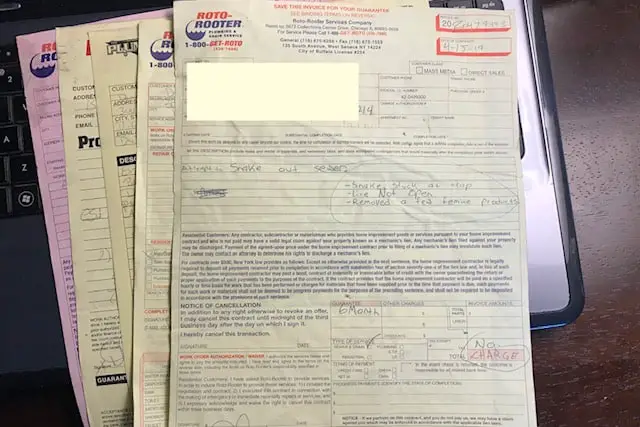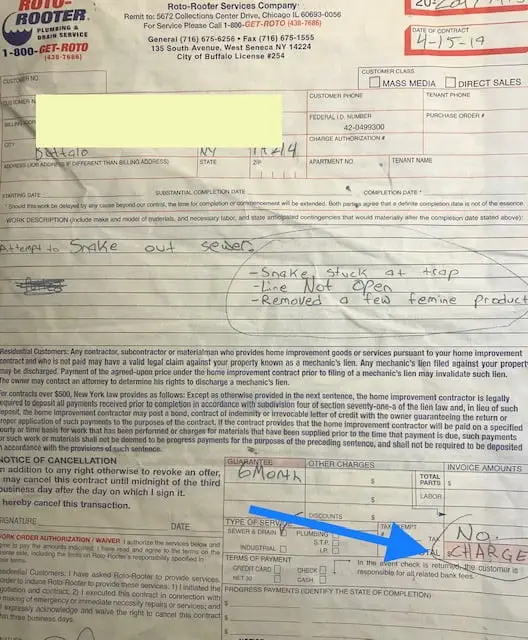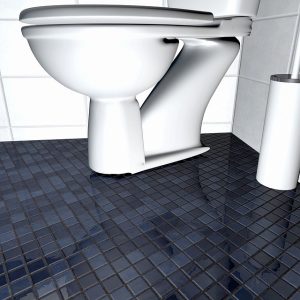posts and pages could include affiliate links which may result in earnings for the site. As an amazon associate, we earn from qualified purchases.
Of all the modern inventions we take for granted, indoor plumbing might be at the top of the list. Think about it this way: Cleopatra wasn’t asking herself, “Why does my sink drain smell so bad?” or “How do I get rid of sewer gas in my basement?” Nope, asking how do you neutralize sewer smell inside the home is a fairly new problem in the history of humanity, but problem it is nonetheless.
What qualifies me to talk about neutralizing sewer smell you ask? Well, when I’m not writing for WhatKillsIt.com, my full time job is property manager and landlord and THAT makes me pretty much expert in other people’s sewage issues!
Here’s my stack of last year’s sewer invoices, all which resulted in backed up basements that stank to high heaven and p.o’d tenants who wanted the residual sewer smell gone yesterday!


The reality of the matter is that sewer gas, putrid drains and raw sewage smells are all unpleasant. Nobody wants to deal with them but some people have to. Here we go…
Raw Sewage Odors: First Things First
If you’re here because of a major backup of raw sewage into a basement or other habitable space then we can’t just cover the smell with a product. In order to neutralize the smell of raw sewage, we must kill the residual bacteria with disinfectants rating for “killing germs” and after that, we tackle the lingering, residual odors.
As a property manager, I deal with this major incident several times a year. If that’s your situation, I recommend one of the following solutions:
Option 1: 2 Step Solution using 2 products
Buy real bleach (must say sodium hypochlorite) for disinfecting, and buy Nok Out odor eliminator for absorbing the residual sewer smells after disinfecting with a bleach/water solution. If you’ve never used or heard of Nok Out, this products is amazing for killing the worst, offensive odors like skunk, smoke damage and of course….sewage.
Here is what nok out looks like and you can click the image to check pricing:

In the 2 step process, first you’ll suit up with proper PPE (mask, gloves and goggles) and then disinfect the entire area with a bleach/water solution. The correct ratio will be on the back of the jug. Use a ratio for salmonella or e.coli which are hard to kill, gram negative bacteria. You can read all about gram negative bateria here.
Allow the area to thoroughly dry, which may take a day or so in a damp basement. Then, pour some Nok Out into a spray bottle, and spray the area generously. The lingering sewer smell should be permanently neutralized by the next day or about 8-12 hours.
It’s important to note that the smell isn’t immediately gone. Nok Out is NOT an odor masking product, it actually eliminates the odor so it takes a little time. But all smells (sewage and bleach) should be eliminated overnight.
Option 2: Do it in 1 Step, Using 1 Product
Buy SNIPER hospital disinfectant or Vital Oxide hospital disinfectant They are both made with Chlorine Dioxide which happens to be an amazing odor eliminator AND disinfectant in one. This 1 Step process might cost a little more, but it will save you from dealing with the harsh fumes associated with bleach.
Both SNIPER and Vital Oxide disinfect the deadliest of bacteria’s. Both are EPA registered hospital disinfectants. Both will eliminate sewage odors.
Here are clickable image to check the price and availability of either product on amazon:
Which Process Do I Prefer?
As a property manager, I use the 1 step process with SNIPER or Vital Oxide because I cannot have harsh chlorine bleach fumes radiating through vents and choking people out.
Neutralizing Sewer Smell NOT Caused by Sewage
If the sewer smell you’re dealing with isn’t raw sewage, but a stinky sewer pipe or waste water drain, that will definately be eliminated with Nok Out or you can try other common household products which we will discuss below.
From this point on, we’ll talk about sewer smell locations and other things you can do when it isn’t a big job like raw sewage in the basement. Read on if you want to learn more about identifying the source or if you’re dealing with smaller jobs.
What You’ll Learn About Sewer Smells
To gain a better understanding of potential hazards and how to neutralize the smell, let’s take a look at a few of the reasons for these odors inside or outside a house. We will cover:
- How to find where the sewer smell is coming from (if you’re unsure)
- What is causing the sewer smell
- DIY solutions to neutralize the smell
- How to deal with the aftermath of a sewage backup
- Who can help with indoor plumbing problems
Sewer Smell Outside House
If you smell a strong sewage odor outside your home or building, your septic tank or faulty sewer line (or a neighbor’s) is likely to blame.
Why would a Septic Tank smell?
Suspect 1
Most septic tanks need the right balance of live bacteria and Oxygen. The wrong balance could be exactly why you are smelling sewage outside your home.
If this sounds familiar, and you know you’re not due for a pumping, look into tablets that will add both bacteria AND oxygen to your tank such as Septifix (link to product).
Just flush these oxygen + bacteria tabs tabs down your toilet and they get to work breaking down organic sludge from the tank. Within 3 days, associated sewage smells should be eliminated.
It’s important to note that adding just bacteria, or just oxygen can prolong the problem and amplify the sewage smell because it’s nearly impossible to determine what is causing the imbalance.
Suspect 2
Septic tanks use a vent pipe (or “stink pipe”) to stabilize pressure within your house’s plumbing system. Usually, hydrogen sulfide and methane gases are released through this pipe, but sometimes there is a problem. If this is the case, the gases will disperse in the ground under your home’s yard.
Because septic tanks require some digging and proper fitting, it’s best left to professionals who know exactly what’s involved. Try searching google for: septic tank repair near me.
Sewer Smell in House: Source Unknown
In 1898, a health professional in New York City described “the waste pipe of the house smeared from top to bottom with the foulest organic matter, putrefying often under the worst conditions,” concluding that sewer gas smell was “the worst enemy of those who live in modern houses.” Another physician claimed, “Sewer gas is today killing more persons every year than the yellow fever in its worst periods of epidemic.”
That’s a pretty big claim to make about a smell! We now know that there are certainly more dangerous things than a disagreeable aroma, but a problem in your home’s plumbing can be embarrassing and downright unbearable. If you experience odor inside your home, the first step is to identify which part of the house it is coming from. Common culprits are:
- drains
- sinks
- showers
- toilets
- dishwashers
- washing machines
This means the sewage odor could be coming from your kitchen, bathroom, basement… maybe even your garage! Any area connected to your home’s plumbing system is potentially to blame.
Sewer Smell in Kitchen
It can be especially difficult to deal with a foul smell in an area of the home where we gather, socialize, cook, and eat.
Where is the overpowering smell coming from? Dishwashers, garbage disposals, and sink drains are the most common source of sewer smells in the kitchen. To neutralize the smell of sewer in the kitchen drains or cupboard that may have been subjected to spilled waste waster or a backed up sewer/sink there are alternatives to bleach solutions.
Drain Pipes
The best step to take when encountering a smelly drain is to pour two cups of hot (not boiling) tap water into the drain. You can also try pouring 1/4 cup baking soda into the drain, followed by one cup of vinegar, followed by a gallon of warm water.
If after two days the smell persists, try removing the drain’s cover. Clean and disinfect the pipe using bleach. This will remove any bacteria.
Removing Sewer Smell from Cabinets
If sewage backed up into a sink base cabinet for instance, you’ll want to kill the bacteria and then continue with odor absorption. Try the diluted bleach solution with Nok Out afterward or use SNIPER as mentioned above.
Neutralizing Sewer Smell in Bathroom
We naturally associate the bathroom with our home’s plumbing system. This makes sense because modern bathrooms have a shower and/or bath tub, a sink, and a toilet, all of which are connected to the home’s septic or sewer system.

This creates the potential for many issues, including a pervasive, overpowering sewer smell coming from the drains of your sink, bathtub, or toilets. A major culprit of the smell of sewage in the bathroom is a decaying wax toilet seal or loose bolts that connect the toilet to the flange where it connects to the sewer line.
When this is the case, you cannot neutralize the smell, it has to be fixed or it will be forever present.
Sewer Smell After Floods
Basements are another common area of the home where sewer smells can emanate and if you’ve had a drain backup into the basement, it’s going to stink for quite some time and does not self-resolve.
What’s worse, is that often times furnaces and air conditioning units are located in the basement and will suck in the stinky basement air and send it throughout the entire household.
The only way to really, truly alleviate the smell of a basement floor drain backup is to kill the bacteria causing the horrendous odor and that means disinfectants.
Clorox bleach is usually the go to and can be a huge help when diluted 1 part bleach to 30 parts water. Wear a vapor approved NIOSH respirator and gloves. Remove anything you don’t want to stain and get cleaning. As you kill the bacteria, the smell should begin to dissipate. Once the basement is thoroughly dry follow up with an odor eliminator.
Alternatively, use a disinfectant and odor eliminator all in one product like SNIPER Hospital disinfectant or Vital Oxide Hospital Disinfectant like we mentioned above.
How to Get Rid of Sewer Smell in House
Even after you disinfect the problem area, sometimes the smell of sewage still lingers. If this is the case, then you have to look at what was in operation during the sewage issue.
Likely suspects are furnace filters, air conditioner filters, fan blades and odor soaked laundry, cardboard, or particle board. Be sure to disinfect everything that was used during your cleanup efforts.
NOTE: Never mix vinegar and bleach. The fumes created are very toxic!
If none of these DIY methods work for getting rid of sewer smell work, you may have a larger issue at hand. Contact a professional plumber immediately.
Is the Smell of Septic or Sewer Harmful
While there are toxins in sewer gas, generally they are not concentrated enough to cause negative health effects. That said, sewer gas could be harmful if the smell is confined to a small space or highly concentrated. Low levels of hydrogen sulfide may cause
- eye irritation
- respiratory issues like a sore throat or cough
- shortness of breath
- fatigue
- loss of appetite
- headaches
- irritability
- poor memory
- dizziness
Again, incidental exposure to sewer gas is usually not concentrated enough to cause health problems. In most cases, sewage odors are more unpleasant than they are deadly. If only those silly 19th century doctors had known the truth!
Conclusion
No one wants to deal with the embarrassing and potentially harmful smell of sewage in or around their home. If your drain still smells after trying the tips above, it is best to contact a professional plumber to inspect the problem further.
Although the stench may not be harmful or deadly, you must get to the bottom of the sewer smell before further issues arise. Cleopatra wouldn’t put up sewer gas smell, and you shouldn’t either.
Article Sources
https://gandhi.gov.in/gandhi-cleanliness.html
https://www.ncbi.nlm.nih.gov/pmc/articles/PMC1275984/
https://www.ncbi.nlm.nih.gov/books/NBK24649/
https://www.ahs.com/home-matters/repair-maintenance/learn-about-plumbing-vents
https://www.angieslist.com/articles/what-do-if-you-smell-sewer-gas-your-home.htm


